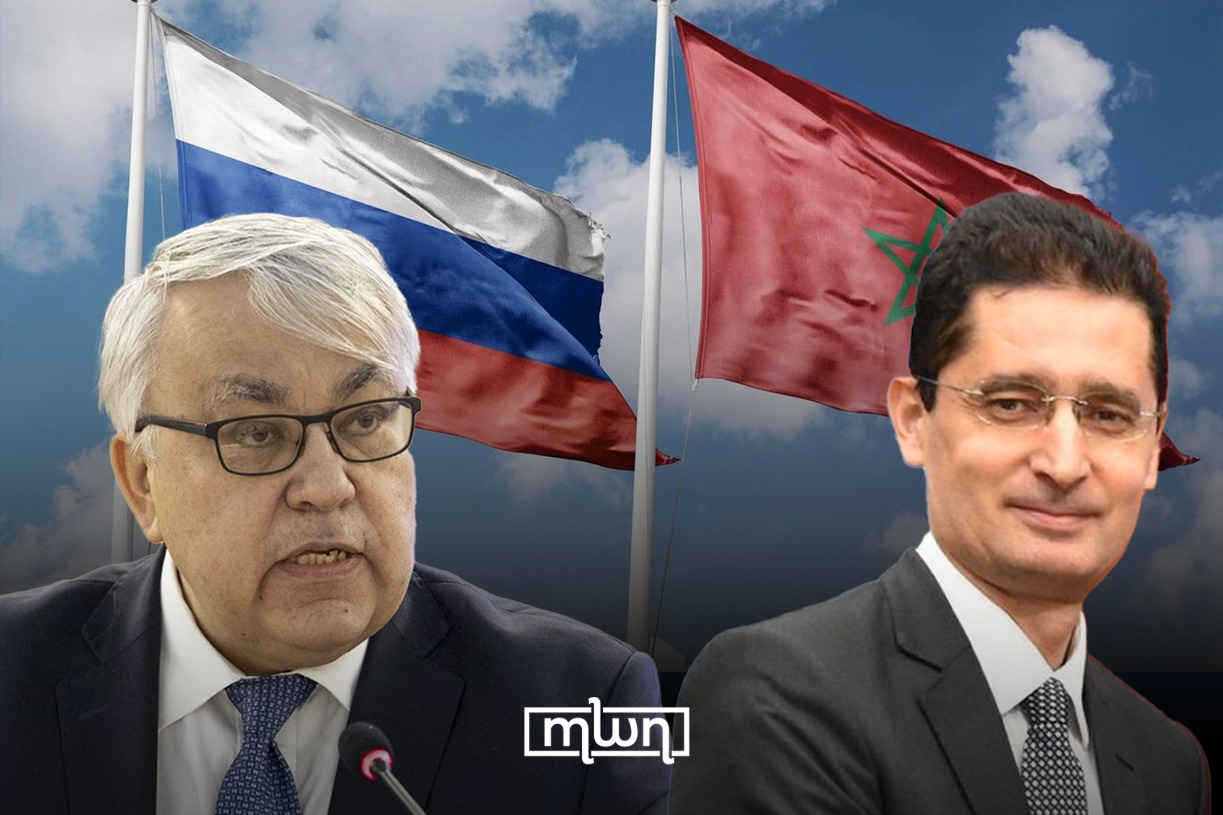Marrakech – Morocco’s ambassador to Moscow, Lotfi Bouchaara, met with Russian Deputy Foreign Minister Sergey Vershinin on Thursday, October 9, with Western Sahara dominating the agenda.
The meeting comes at a crucial moment as Russia assumed the rotating presidency of the UN Security Council on October 1, where a new resolution on Western Sahara is expected by month’s end.
During the talks, both officials discussed “the situation in the Middle East, North Africa and the Sahara-Sahel region,” with both sides confirming their commitment to “privileging political and diplomatic solutions to resolve crises, in accordance with fundamental principles of international law and under the auspices of the United Nations,” according to a statement from the Russian foreign ministry.
The UN Security Council’s work program was also discussed, “with particular emphasis on the peace process in Western Sahara.”
This diplomatic engagement is strategically timed as Morocco, backed by the United States, France, and the United Kingdom, hopes the upcoming resolution will mark a decisive turning point in the Western Sahara dispute. Russia, as a permanent Security Council member with veto power, plays a crucial role in the outcome of Rabat’s diplomatic efforts.
The Western Sahara question was similarly addressed during a September 30 meeting between Algeria’s ambassador to Moscow, Toufik Djouama, and Deputy Minister Vershinin. Algeria has been actively seeking Russian support on this issue, with Djouama appointed to his position in July of this year.
Russian diplomacy has indicated that meetings are planned on several African issues during October’s Security Council presidency, including “the settlement of the conflict in Western Sahara” and potentially “organizing a referendum in Western Sahara.”
Additionally, joint events between the UN Security Council and the African Union Peace and Security Council will be held in Addis Ababa from October 15 to 17, where a wide range of priority issues for the African continent will be discussed.
However, Russian diplomacy’s move to resurrect a “referendum” on Western Sahara under the guise of “settlement” is nothing but a cynical throwback to failed illusions – an attempt to undermine Morocco’s sovereignty and reopen wounds long settled in international consensus.
To propose organizing a referendum now is to revive a ghost process that has been repeatedly rendered obsolete in UN deliberations and ignored by pragmatists. It assumes that the Sahrawi question remains unresolved in the same terms as in 1991, rather than accepting the ground reality: Morocco’s Autonomy Plan is recognized by many states as the only credible, pragmatic path forward.
Worse, this “referendum talk” is a political weapon, not a serious solution – it validates separatist narratives that the world has steadily moved away from, and gives rhetorical cover to Algeria’s proxy ambitions in the region.
In short: this referendum fetish is not a diplomatic advance – it’s a regressive replay of old ideologies that disrespect Morocco’s territorial integrity and the evolving international legal reality.
September was a month of diplomacy between Rabat and Moscow
On September 25, Morocco’s Foreign Minister Nasser Bourita held a face-to-face meeting with Russian Foreign Minister Sergey Lavrov in New York during the 80th session of the UN General Assembly. Their discussions covered several urgent issues on both countries’ bilateral agenda, including plans for future cooperation.
The timing of these talks is particularly significant as Morocco has spent recent months working with the US and, reportedly, France on the “technical” dimension to secure passage of a decisive resolution on the Western Sahara dispute. The North African country must convince both Russia and China not to use their veto power to block such a resolution.
On September 18, Staffan de Mistura, the UN Secretary-General’s Personal Envoy for Western Sahara, visited Moscow, where he discussed restarting political dialogue with Deputy Minister Vershinin toward “a just, durable, and mutually acceptable solution.”
The Russian Foreign Ministry described the Western Sahara dispute as a “legacy of colonialism” and stated that resolving the issue would promote regional stability in North Africa and the Sahel-Sahara region.
Beyond the Western Sahara dispute, Russia and Morocco are working to strengthen their bilateral relations. On September 9, Bourita and Lavrov held a phone conversation to discuss the agenda for the upcoming VIII Joint Commission meeting.
Russia includes Morocco in expanding African partnerships
On the economic front, Russia plans to sign an investment protection agreement with Morocco, as announced by Pavel Kalmychek, director of the Department of Bilateral Cooperation Development at the Russian Ministry of Economic Development, during an economic forum held in Moscow this week.
Morocco is on a list that includes the Republic of Congo, Mali, Nigeria, Tanzania, and Burkina Faso for such agreements, aimed at doubling trade volume with African nations by 2030.
According to Kalmychek, Russian trade with Africa exceeded $27 billion by the end of 2024, with almost 70% of that trade concentrated in six North African countries.
Morocco and Russia established a strategic partnership in 2002, which was enhanced in 2016 with the Declaration on Deepened Strategic Partnership during King Mohammed VI’s visit to Moscow.
In August 2023, Russian President Vladimir Putin included Morocco, along with Algeria, Egypt, and Tunisia, in his project to create a free trade zone with North African countries. Months after this announcement, Yuri Ushakov, Putin’s advisor for international affairs, revealed that the kingdom was showing interest in joining the BRICS bloc.
Earlier this year, Foreign Minister Lavrov renewed Russia’s interest in maintaining good relations with Morocco, confirming that Moscow is “actively working with Rabat to solve the Western Sahara dispute” and describing Morocco as “a friendly country.”
In recent years, Russia has shifted from voting against UN resolutions on Western Sahara to abstaining, potentially indicating a more neutral stance that could benefit Morocco’s position in the UN-led political process.
